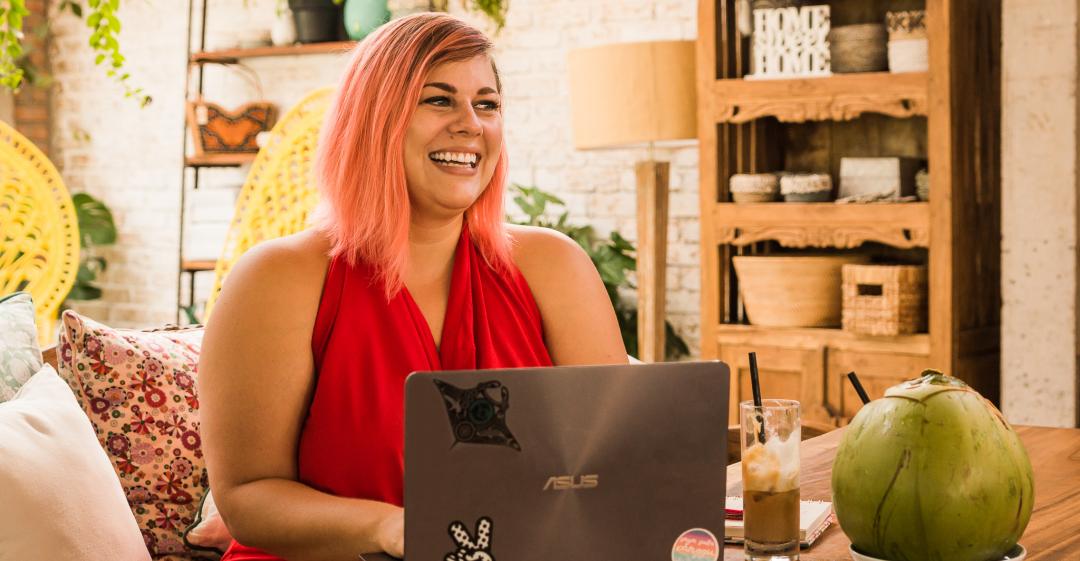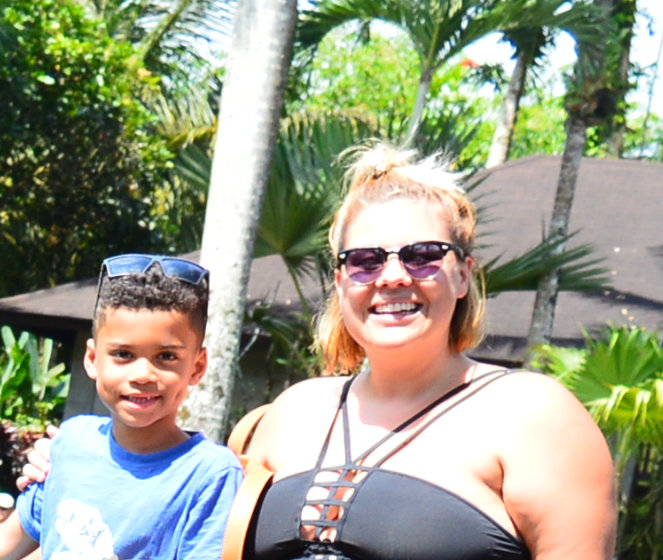“It was miserable. I knew there had to be a better way.”

Newly Updated
What work were you doing previously?
I studied to be a primary school teacher.
I was able to teach in Slovakia for a year before returning to America. When I did I found myself in a state with no budget for education, that was having to fire teachers left and right.
So, I worked as a nanny for a while, until I got an internship as a Product Manager for a software start-up. I worked there for two years, and then did software training around the country for a year after that.
What are you doing now?
Now I'm CEO of my own agency creating online courses and programmes for influencers in the personal development niche.
I also teach other women how to work from home as virtual assistants, using my own programmes.
How did you feel in your work before you decided to make the change?
I loved what I did in every role, but the lack of flexibility around holidays and sickness was just too much for me.
My husband was on active military duty – he was either deployed or working nightshifts – and I was alone with my son 24/7. I'd wake up at the crack of dawn to get him to childcare, commute an hour to work, pick him up after dark and muddle dinner and bath time together before passing out.
It was miserable. I knew there had to be a better way.
Why did you change?
I was crying all the time.
I didn't understand how we could be created just to slave away at a job, all day every day, for the rest of our lives.
I knew people were working from home and there were more flexible options out there somewhere – I was determined to figure it out for myself.
When was the moment you decided to make the change?
I remember it so well.
I was travelling for the software training role. The job was supposed to be travelling two weeks per month but they had us stuck on sites for three weeks at a time, with one week off and then back again for three weeks.
I couldn't take it. I was so sad. I felt like God was telling me "There is more to life than this! Trust me!"
So, I talked to my husband. We had very little savings but he supported me 100%. The next day I called my boss to hand in my notice.
I had no idea what I was going to do but I knew there had to be something better than this.
How did you choose your new career?
I started applying for virtual careers all over the internet so I could work from home.
I was accepted for a job as an assistant for a CEO running an online course-creation agency. Eventually the CEO shifted her business, and I just continued down the path.
Are you happy with the change?
I am beyond happy.
Last year my husband got out of the military and had a severe mental health breakdown. The life I'd created for myself allowed my son and I to leave when we needed to and start our 'digital nomad' journey.
We are now based in Bali and jump from here around Asia and the world – something I never would have been able to do as a single parent working for a company in America.
Living in Bali allows us a different level of living. We have a villa overlooking a rice field, a driver to take my son to and from his expat school, a full-time housekeeper / nanny, a groundskeeper, chef, and a massage therapist on call. I am never going back!
It's funny because working for myself from home doesn't mean I work less then I did before; in fact, I probably work more. But I can do it around our schedule and on my own terms, which makes all the difference.
What do you miss and what don't you miss?
Sometimes I miss working with other people – I get lonely.
But I also get a lot more done in a lot less time, so it's skyrocketed my growth in just five years because of the focus I am able to achieve.
I've also cultivated a strong community of other female entrepreneurs and grown my own team, so we can chat during the day and meet up to work around Bali and the rest of the world too. Socialising has become harder, but not impossible. It's just something you have to work at.
I don't miss anything else. I don't miss having a boss, never being able to take time off, never being able to travel or work from where I want, office politics, working on other people's passion projects… none of it.
How did you go about making the shift?
I focused on finding at least one part-time virtual gig and cut all other expenses.
I pulled my son out of childcare at the time and worked around his schedule, and I cut our grocery and living expenses (which is much easier to do when you aren't working in an office).
As my income and client base grew, I enrolled my son back into pre-school, first part time, then full time. I went from shopping for and cooking all of our meals to using meal delivery services, etc.
I slowly built up to the point where I had so many clients and projects that I had to hire my own help. Now we have a team of 12.
What didn't go well? What wrong turns did you take?
Honestly, most of this journey has been made up of mistakes.
The important thing has been choosing not to give up and to instead just change tack.
Early on I never charged enough. I was so anxious to be able to work from home that I took anything. It was then tough to move up my prices once I realised this.
I also never dreamed things would get so huge that I'd be running a team, so I branded my business services around myself and it made it really hard to grow.
I also used to only bill after services were rendered, which resulted in constant financial stress for our family. Clients would take forever to pay me and we never had consistent streams of income.
How did you handle your finances to make your shift possible?
We had a small amount of savings that covered me for the two months that I was looking for virtual work and going through the interview processes.
Plus, as I've already mentioned, we cut down all extra expenses.
Once I got a part-time virtual gig, we didn't even need that much money per month because we were able to live on just my husband's income.
What was the most difficult thing about changing?
I had zero idea of how to run a virtual business.
And, honestly, I still have no idea what I am doing.
I've just had to keep learning the hard way about getting people to pay up front, getting clients on retainers, having delivery dates beyond when you expect to be done so you can prepare for the worst, early project cancellation fees.
All of these things have lost me serious money, but I've learned from my mistakes.
What help did you get? 
Facebook groups with more senior female entrepreneurs and virtual assistants have helped me a lot.
I've asked all kinds of questions there and received all kinds of help!
Also my husband was always a voice of reason for me. He could tell when I was stressed and overdoing it – usually it was because I didn't know my worth. He always reminds me of what a great job I do and how I should expect to be treated.
What resources would you recommend to others?
If you want to be a virtual assistant, take a look at our VA training programmes.
We include portfolio-building tasks, help you find legitimate virtual work, and support your entire transition as a community. It's the programme I wish I'd had when I started!
What have you learnt in the process?
I've learned to spend time getting to know what I actually want.
I've had to recheck this – every day, sometimes. But otherwise I would have just kept trudging along the path I was on and all of a sudden looked up and realised I'd wasted all this time.
What would you advise others to do in the same situation?
Check in with yourself: are you happy where you are now? If not, then where do you really want to be?
If you want to work virtually, assess why and how much money per month you can realistically live on. The 'why' will determine the types of virtual work you should pursue. The money part will help you determine how much work you need to do to get there.
You may be surprised by how many fewer hours you'd need to work. But don't just blindly run down the path of working virtually without a solid understanding of those two things first.
We caught up with Esther recently to see how her shift was working out, a couple of years on. Here's what she's been up to, and the biggest lessons she's learned.

What's changed for you in your career since we first published your story?
I grew my online course agency to become a six-figure business and was managing a team of 12.
But after creating other people's online courses for five years, I wanted to focus more on my own. Now I've helped over a thousand women work online as virtual assistants around the world.
How do you feel about your work now?
Working on my own course, team management, and marketing has been a big change.
That said, it's been absolutely amazing.
When I running my course on the side, while running my agency, I was only able to help between 30 and 50 students per year to work online. But now I've just helped over 260 in one month alone!
It's so fulfilling to help students learn online work skills and then get jobs, way more so than building other people's courses, like I was doing previously.
What challenges have you come up against since making your shift, and how exactly have you dealt with them?
I had a huge mindset issue around focusing 100% on my own programmes.
I didn't think I'd ever make enough money, that nobody would want to listen to me, and that it'd be a total failure. I had to work through those issues in order to feel confident enough to close my agency and fully transition into running my own programmes.
How is the financial side of things panning out, and is this what you'd expected?

I tracked how much I was making from my courses compared to the agency building other people's courses. Once I saw over several months that my online courses were making more money without as many expenses, it was an easy decision to close the agency.
Now, I've tripled my income in one year through just focusing on my own course.
What have you learned, since making your shift?
To believe in yourself and your own offers.
If you aren't passionate about where you are right now, then keep on shifting! Making one career change doesn't mean it's the end, we are always evolving.
To find out more about Esther's business, visit www.90DayVA.com.
What lessons could you take from Esther's story to use in your own career change? Let us know in the comments below.



